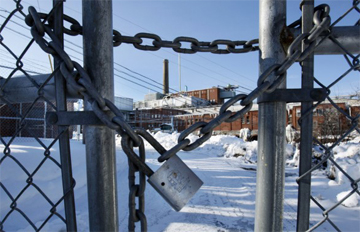 |
||||||||
| October 15, 2014 | ||||||||
| Headbox reconditioning yields better dry weight profiles |  |
|||||||
|
∑ Subscribe to Ahead of the Curve ∑ Newsletters ∑ Ahead of the Curve archived issues ∑ Contact the Editor
|
Why Maineís Paper Mills are Closing (EDITOR'S NOTE: The following is based on an article by Darren Fishell that appeared in the business section of the Sun Journal, Lewiston, Maine, on October 3, 2014.) According to an article published October 3, 2014, by the Sun Journal, Lewiston, Maine, thereís no one explanation for why three Maine mills have closed so far this yearóEast Millinocket, Old Town, and Bucksport each supply, or supplied, different marketsóbut they share the common challenge of relatively high costs for energy and wood while demand for their current products has declined. The three mills that closed were in tough markets. According to the newspaper article, market pulp produced by Old Town Fuel & Fiber was competing with cheap, fast-growing eucalyptus pulp from South America, and the company had no paper machines, tying its fate to global pulp prices. The Great Northern Paper mill in East Millinocket was producing newsprint and paper for books being displaced by digital technologies. Versoís Bucksport mill produces coated paper used in magazines and brochures, a market where the U.S. has shed significant production capacity in recent years, also in response to the digital shift. Each mill had unique challenges. For all of the things they shared, each mill faced its own specific challenges. Old Town had a problematic biomass boiler and its plans for a companion business in wood-derived biofuels didnít come together as quickly as planned. Managers of the East Millinocket mill also had trouble launching an energy-sector companion business to provide wood pellets to European markets. And the Bucksport mill operates under the umbrella of Verso Paper, which has larger mills in Jay, Maine, and Quinnesec, Mich., and is in the process of acquiring NewPage, which has a mill in Rumford and seven others. Coated paper still has a future in Maine according to John Williams of the Maine Pulp and Paper Association, regarding the closure of Bucksport, a move he said surprised him. But he added that the closure doesnít presage doom for the stateís coated paper industry. "We make a lot of it, we make it well, and weíve always been very competitive," Williams said. "Itís certainly for the workers in Bucksport, a very difficult decision, but I donít think it means that the industry is in trouble." Sappi makes coated paper in Skowhegan, NewPage produces it in Rumford, and Verso also makes it in Jay. Bob Mundy, SVP and CFO at Verso, said some coated paper production that was in Bucksport could be taken up in Jay. Demand for tissue production has bucked the trend, the article noted. Tissue machines are being added at St. Croix Tissue in Baileyville, and demand for tissue paper remains strong, as itís hard to replace. In the past 19 years, the trade publication Pulp & Paper Week reported, total U.S. tissue paper production capacity increased an average of 1.8% per year. Those mills arenít without challenges, however, particularly from abroad. Lincoln Paper & Tissue in December announced indefinite layoffs for hundreds of employees, citing the loss of a major customer to a mill in Indonesia. That disclosure did not identify a specific mill, but the Jakarta, Indonesia-based Asia Pulp and Paper announced in 2012 that it plans to install 42 new tissue machines at mills in China and another 15 at mills in Indonesia. Maine mill jobs have been on a long decline. Maine paper mills employed more than 15,000 people at the end of 1990, about 10,000 more than at the end of 2013. Thatís a 66% employment decline in 14 years. Production for most of that period continued to rise and the number of paper mills held relatively steady, hitting a peak of 28 in 2006. That number dropped sharply in early 2007 to about 18. There were 12 mills operating in Maine as of the end of 2013 and three have shut down this year. Owners and state officials are seeking buyers for each site, including the bankrupt East Millinocket plant where trustee Charles Stanziale said finding an owner interested in restarting the mill is a priority. Now that you
are Ahead of the Curve, stay there by joining TAPPI. |
|||||||
 |
||||||||
